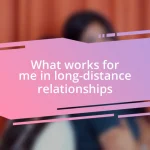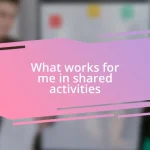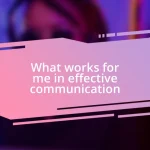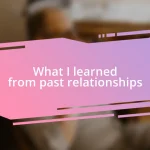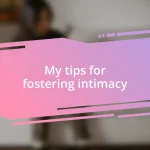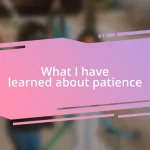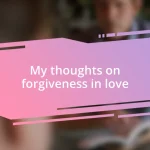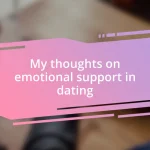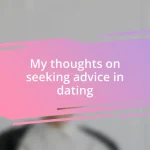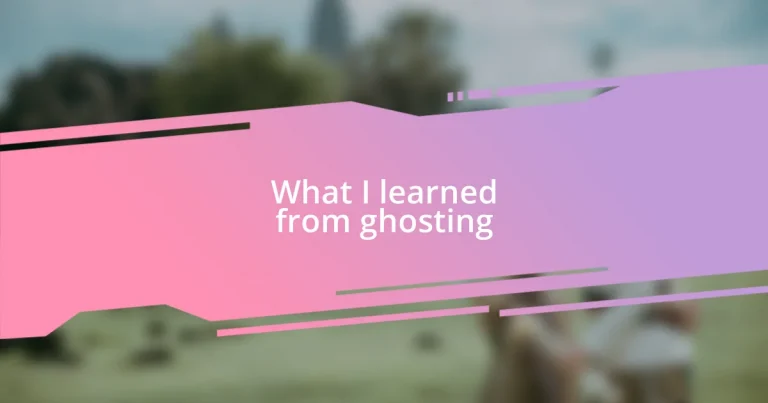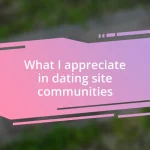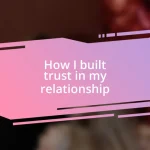Key takeaways:
- Ghosting is a form of avoidance rooted in fear and discomfort, often causing emotional turmoil for the ghosted individual.
- Coping with ghosting involves self-reflection, open communication, and engaging in self-care activities to rebuild confidence and resilience.
- Moving forward after ghosting requires trusting oneself, setting clear boundaries, and adopting an optimistic mindset to foster healthier future relationships.
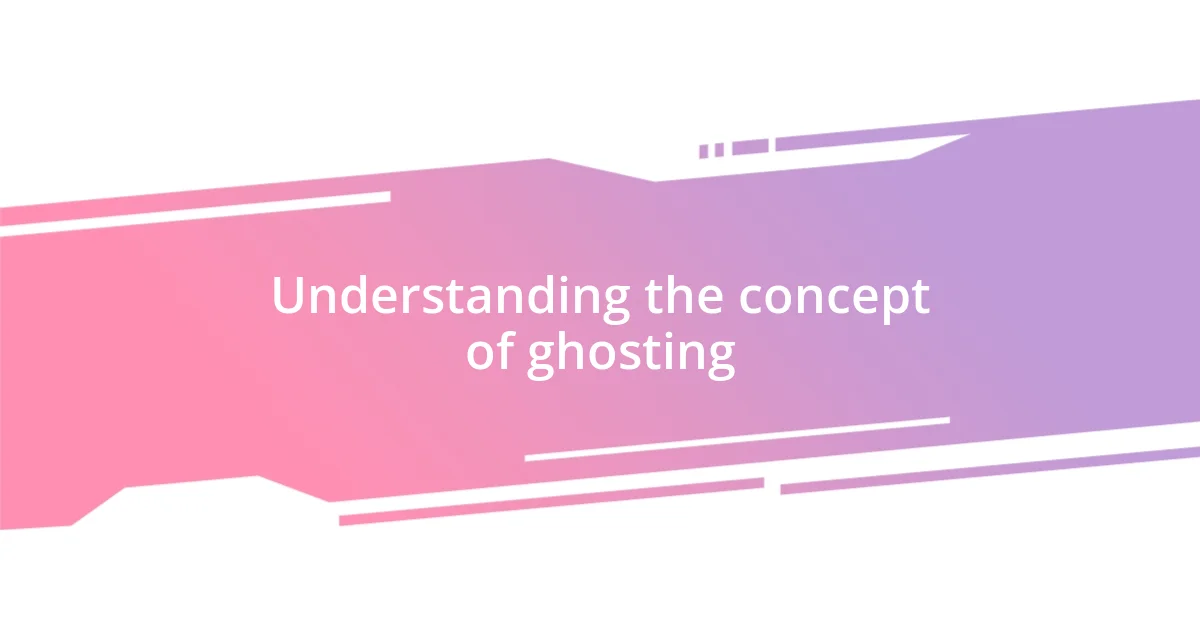
Understanding the concept of ghosting
Ghosting is the abrupt cessation of communication in a relationship, often leaving the ghosted individual in a state of confusion. I remember when a close friend simply stopped responding to my texts, and at first, it felt bewildering. It made me ponder: why do we choose silence over an honest conversation?
For many, including myself, ghosting can trigger feelings of insecurity and self-doubt. I vividly recall the moment I realized I had been ghosted; it was as if the air had been sucked out of the room. I found myself questioning my worth and the value of the connection we shared. Isn’t it strange how a simple act of silence can evoke such deep emotions?
Understanding ghosting means recognizing it as a form of avoidance, often stemming from discomfort or fear of confrontation. I think about how many relationships might benefit from clarity instead of coldness. Wouldn’t it be more constructive to express one’s feelings openly rather than to drift away? The complexity of ghosting reflects how we navigate emotions and relationships in today’s fast-paced world.
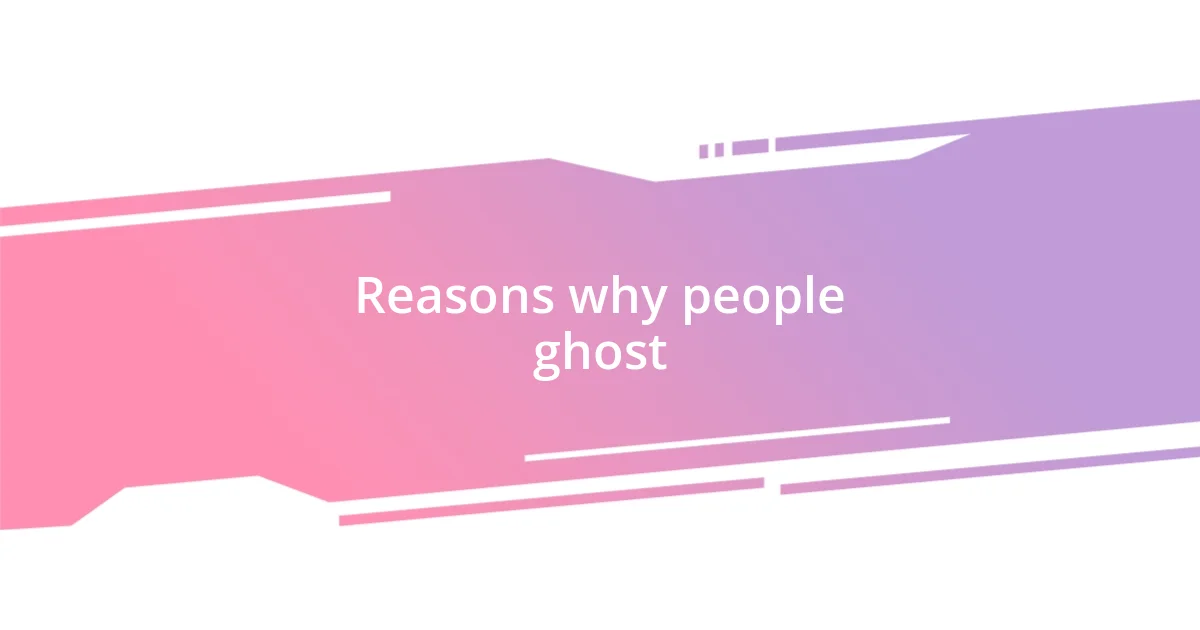
Reasons why people ghost
When considering why people choose to ghost, it often stems from a mix of fear and discomfort. For instance, I once found myself in a situation where I felt overwhelmed by the emotional weight of a friend’s expectations. Instead of addressing my feelings, I simply went quiet. In moments like these, it feels easier to vanish than to confront the reality of the situation, even though that decision can leave others hanging in uncertainty.
Here are some common reasons people ghost:
- Fear of confrontation: Many individuals find it challenging to face difficult conversations head-on.
- Avoiding uncomfortable feelings: Ghosting can be a way to sidestep the emotional labor involved in a breakup.
- Uncertainty about feelings: When someone is unsure about their emotions, they might opt for silence instead of clarity.
- Lack of investment: Sometimes, if a person feels less invested in the relationship, they may not see the need for a formal closure.
- Time constraints: In our busy world, some might feel they simply don’t have the time for a conversation, leading to a withdrawal.
Reflecting on my past experiences, I’ve seen how different motivations can dictate one’s choice to ghost. It’s intriguing to note how an urge to protect oneself can inadvertently hurt others. I empathize with the ghosters, yet I also understand the pain it can cause the ghosted.
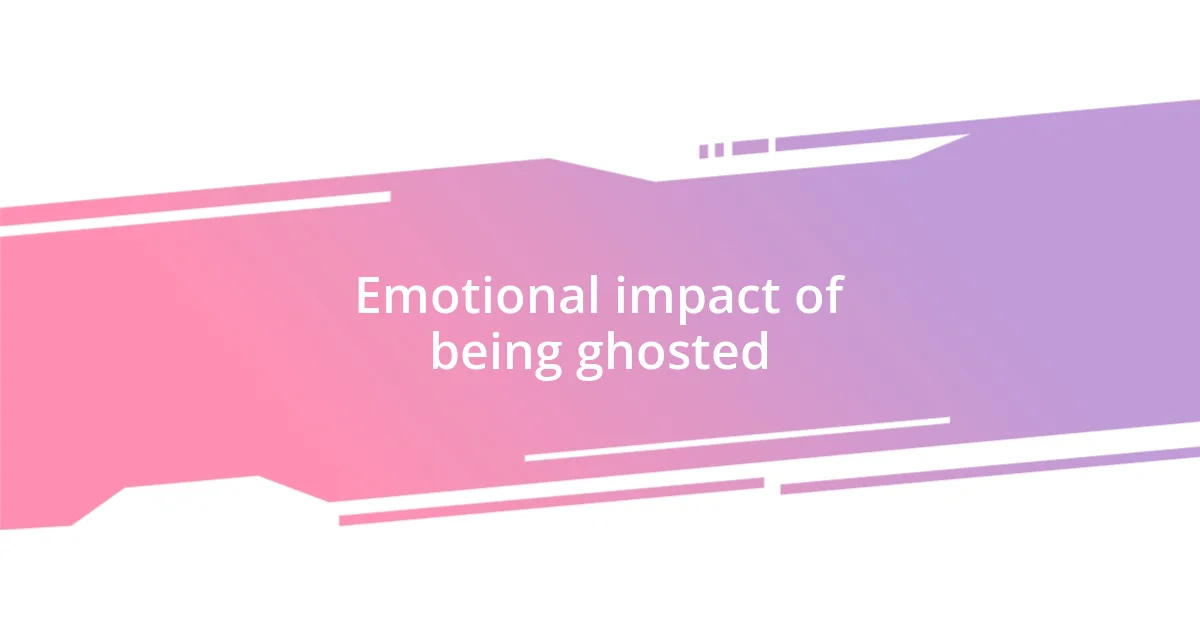
Emotional impact of being ghosted
Being ghosted can create a whirlwind of emotions that often catch us off guard. I experienced this firsthand when a romantic interest suddenly disappeared from my life. That silence left me grappling with feelings of rejection and a sense of profound loneliness. It’s fascinating how a simple lack of communication can spiral into a cascade of negative thoughts. I began to replay our interactions, questioning everything I said and did. Have you ever felt that sense of confusion when someone just fades away?
The emotional scars from being ghosted can linger long after the event itself. I remember speaking to a friend who had been ghosted after a few dates. She told me that it felt as though her self-esteem had taken a hit—almost like a validation of her worst fears. Ghosting doesn’t just impact your present; it can ripple into future relationships, making it hard to trust again. I too found myself second-guessing my instincts, wondering if I’d ever be able to connect with someone without the nagging fear of being ghosted again.
In the aftermath of such experiences, healing takes time. I often find myself reflecting on how crucial it is to communicate openly, both for our well-being and that of others. Emotional resilience becomes paramount after ghosting. I learned that processing these feelings and reaching out for support can pave the way for recovery. After all, navigating these emotional landscapes together can foster a deeper connection in our relationships.
| Emotional Impact of Being Ghosted | Personal Experience |
|---|---|
| Feelings of Rejection | Questioning worth and value |
| Lost Trust | Feeling uncertain about future relationships |
| Lingering Loneliness | Experiencing prolonged sadness |
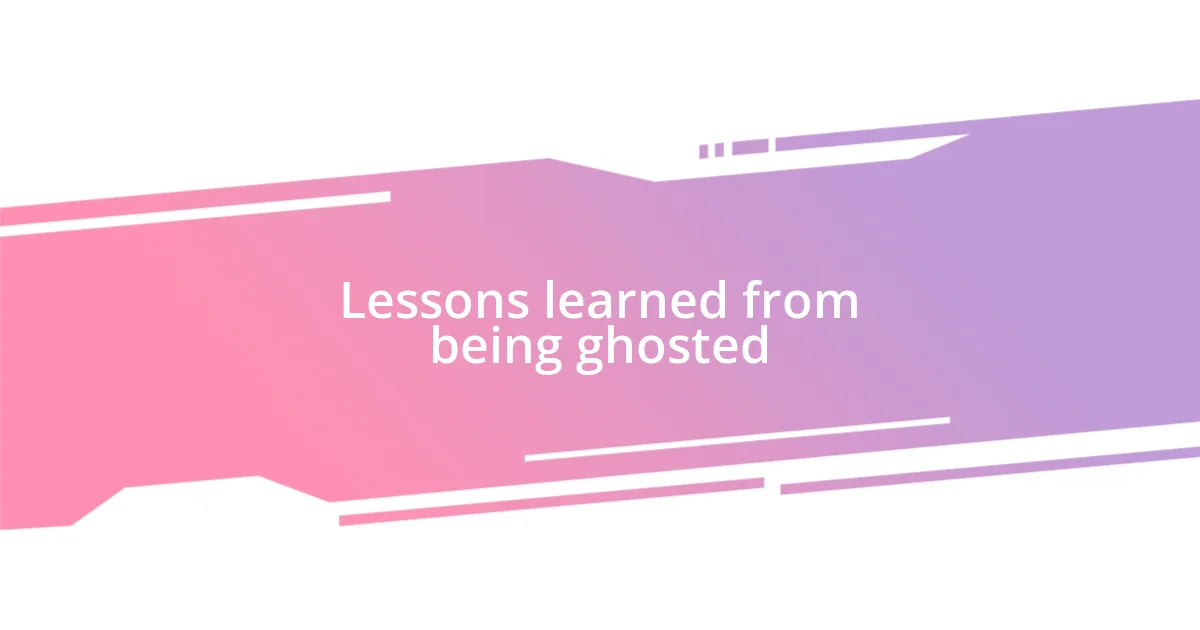
Lessons learned from being ghosted
Lessons learned from being ghosted can be profound and multifaceted. For me, one key takeaway was the importance of self-awareness. When I faced the silence of being ghosted, it forced me to examine my own emotions more closely. Why did it bother me so much? It became clear that my feelings of rejection were tied to my self-worth, illuminating areas where I needed to grow. I learned that understanding the roots of my reactions could be empowering.
Another lesson I embraced was the necessity of closure—whether it comes from another person or from within myself. I recall a time when I chose to reflect on a past situation instead of seeking answers. This self-reflection, albeit painful, was crucial for my personal growth. Have you ever found solace in processing your own feelings rather than waiting for someone else’s explanation? It’s a powerful realization that sometimes, the closure we seek must come from our own understanding and acceptance.
Lastly, I discovered the value of open communication in all my relationships. After being ghosted, I made it a point to express my feelings more openly instead of leaving things unsaid. I remember a conversation I had with a friend about how honest dialogue can prevent misunderstandings. It struck me that each relationship I engage in should be built on trust and transparency. This commitment not only helps guard against future ghosting but enriches my connections, fostering deeper intimacy and understanding with others.
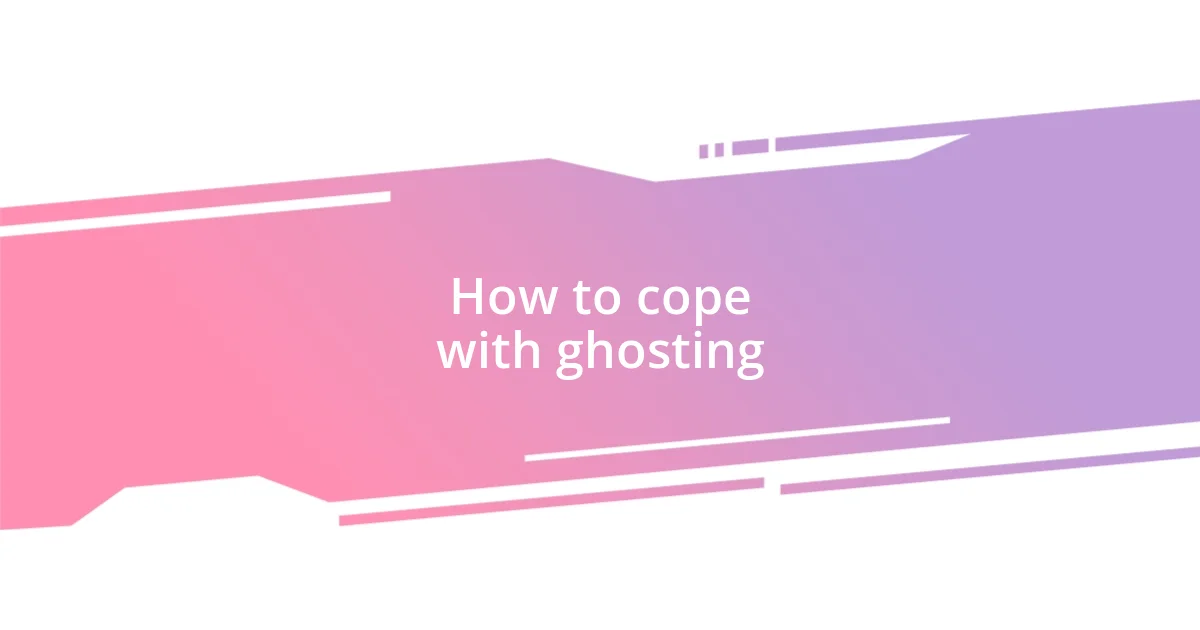
How to cope with ghosting
Coping with the aftermath of being ghosted can be a challenging journey. I still remember after I was ghosted, I found comfort in journaling my thoughts. Pouring my feelings onto the page helped me untangle the emotional mess in my mind. It raised a question for me: how often do we allow ourselves the space to truly feel what we’re feeling? By giving myself permission to express my thoughts, I began to understand that my pain was real but so were my strengths in coping.
Sometimes, it helps to talk things out with friends who can offer different perspectives. I had a friend who, after hearing my story, reminded me that ghosting often reflects more about the other person’s struggles than my worth. That realization was liberating, turning my embarrassment into understanding. Have you ever noticed how sharing your experience can lighten the emotional load? The act of voicing your feelings can create connection, helping to dissolve the isolation that ghosting often brings.
Engaging in self-care activities became another essential tool for me. Whether it was picking up a new hobby or dedicating time to exercise, these pursuits not only distracted me but also boosted my confidence. I learned that focusing on what makes me happy was a powerful counter to the negativity of being ghosted. What activities bring you joy? By prioritizing self-care, I found not just solace but also a newfound sense of resilience, reminding me that my self-worth isn’t defined by others’ actions.
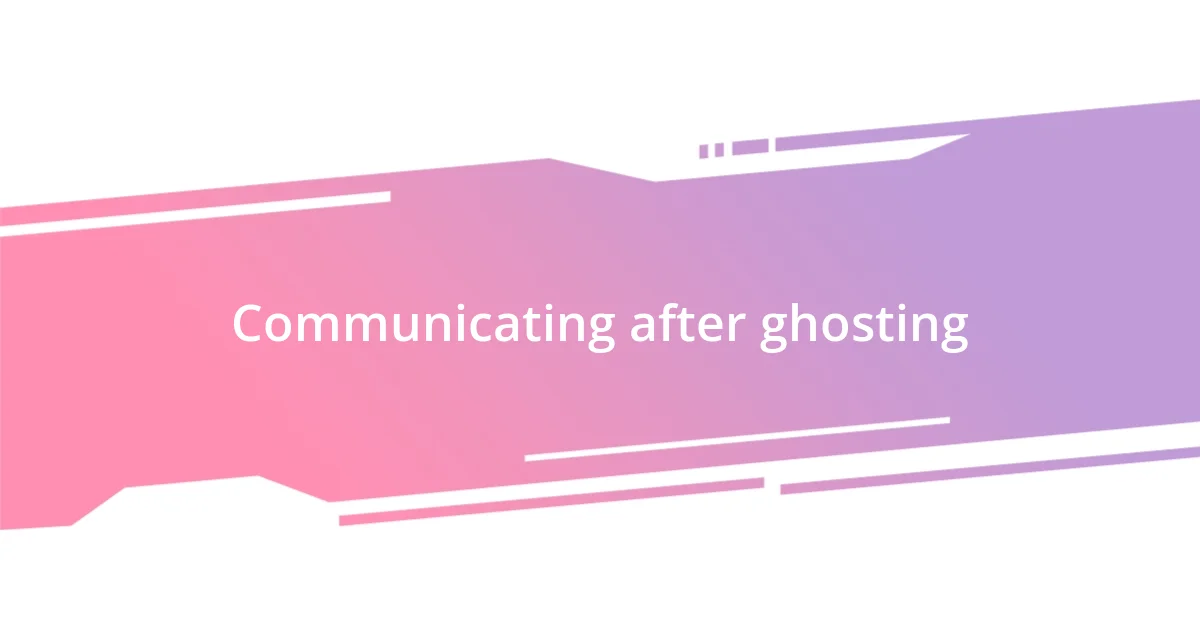
Communicating after ghosting
After experiencing ghosting, I found that reaching out to the person who ghosted me was both brave and nerve-wracking. I remember sending a simple message, expressing my confusion and my hope for some clarity. Did it feel risky? Absolutely. But I realized that, for my own peace of mind, it was essential to communicate openly instead of allowing bitterness to fester. Sometimes, we simply need to allow ourselves to voice our feelings, even if the outcome is uncertain.
In another instance, I reached out to a friend who had ghosted me, sharing my feelings without blame. I expressed that their silence had left me wondering about our connection. Their response was unexpected, but it provided valuable insights into their own struggles. Have you ever been surprised by what someone has to say when you approach them gently? This kind of dialogue can uncover layers of misunderstanding and pave the way for healing, even if the past can’t be fully rewritten.
One of the most surprising lessons I took from these encounters was the power of vulnerability in communication. When I bravely shared that I felt anxious about being ghosted, it opened up a genuine conversation about fears and insecurities we all face at times. I realized that in being vulnerable, I created a space for others to express their own thoughts. It made me wonder, why is openness often seen as a weakness, when it can lead to such profound connections? Embracing vulnerability has since become an integral part of my interactions, enriching my relationships and fostering a deeper sense of community.
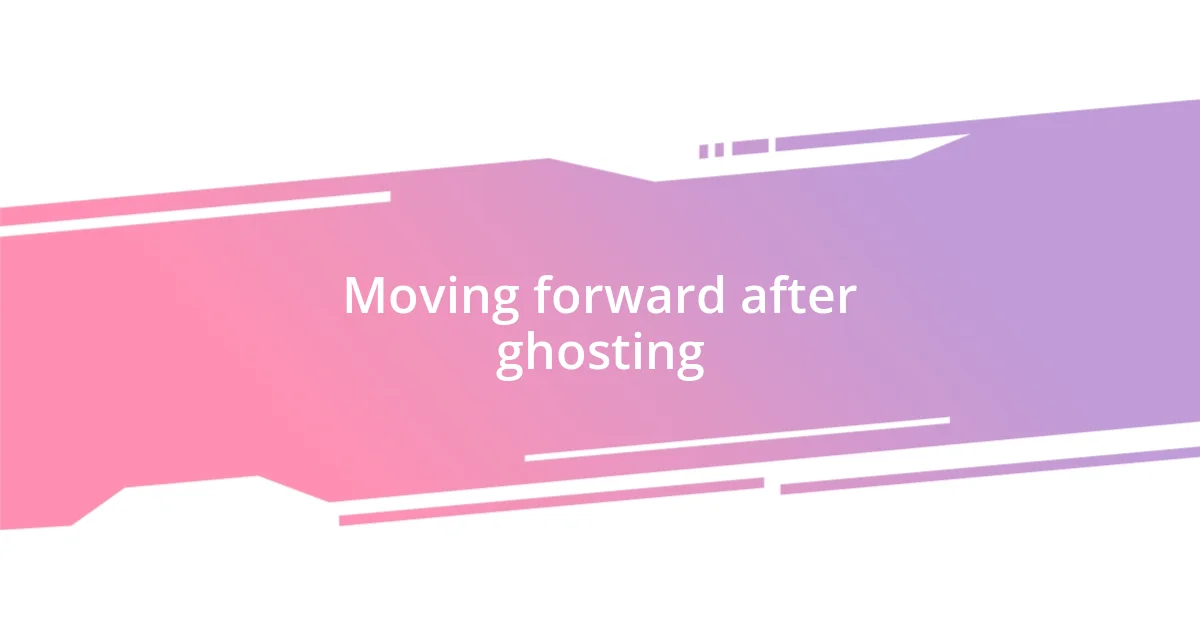
Moving forward after ghosting
Moving forward after being ghosted isn’t just about picking up the pieces; it’s a time for reflection and growth. After my experience, I decided to re-evaluate what I wanted from future relationships, recognizing that those unanswered questions can serve as a catalyst for self-discovery. Have you ever taken a moment to think about what your experiences teach you about your own needs? This reflection allowed me to redefine my boundaries and seek connections that align more closely with my values.
One of the most profound shifts I made was learning to trust myself again. I remember walking in the park, replaying the moments leading up to being ghosted. It hit me that trusting my instincts was key to preventing similar situations in the future. What if I listened more to what my gut told me? Embracing that internal dialogue helped me understand the importance of being attuned to red flags, empowering me to make choices that honor my worth.
I also found that moving forward means embracing a mindset of abundance rather than scarcity. Initially, the fear of being ghosted again loomed over me like a dark cloud. Yet, I chose to focus on the possibilities instead. “What if there are amazing people out there waiting to connect with me?” I began to approach dating and friendships with renewed optimism. This shift helped me cultivate a healthier perspective, turning what could have been a negative experience into a powerful lesson in resilience.
